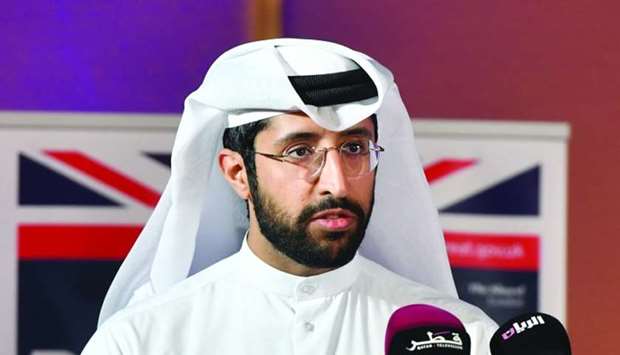The small and medium-sized enterprise (SME) sector is a key driver of the state’s economic diversification, and a tool to promote the country’s industrial and productive potential in line with Qatar National Vision 2030, said acting undersecretary for Trade Affairs at the Ministry of Commerce and Industry Saleh bin Majid al-Khulaifi.
He was addressing the two-day ‘3rd SMEs Conference’ organised by Qatar Chamber and the British Embassy in Qatar on Monday.
Al-Khulaifi said the state has accelerated the development of the SME vital sector by implementing “stimulating legislative and administrative frameworks.”
He said the government also launched national initiatives and programmes that support entrepreneurs and SMEs. Efforts were also made to make their products and services competitive in the local market, as well as initiatives to support their export capacities at the regional and global levels.
“Recently, the Ministry of Commerce and Industry, in co-operation with Qatar Development Bank (QDB), has launched the ‘Land and Industrial Loan’ initiative to provide support for Qatari investors and encourage entrepreneurs and SMEs to easily invest in the industrial sector. To build an open economy, the country issued and updated many laws, including one that allows foreign investors to own 100% in various sectors,” said al-Khulaifi, who also praised the “robust Qatar-UK relations.”
According to al-Khulaifi, Qatar-UK relations formed an impetus for the conference to shed the light on British expertise in SMEs sector. He also lauded Qatar Chamber’s role in organising events that support the private sector and enhance its contribution in the economic process of the country.
During the conference, experts and government officials gathered during three panel discussions, which delved on the following topics – ‘Law & Investment’, ‘Sports & Tourism’, and ‘Connected Qatar’.
‘Law & Investment’ provided an overview of the SME sector in the UK and Qatar, and included discussions on the rules and regulations surrounding business in the UK, the implications of Brexit to the UK market, as well as the current business opportunities in the UK for Qatari business and vice versa.
The discussion also touched on the UK and Qatar business and regulatory environment, including tax regulations, talent, and why the UK and Qatar are both ideal investment destinations and great places for SMEs to develop.
‘Sports & Tourism’ discussed the opportunities for SMEs within the sports economy and tourism sectors in Qatar. It also covered the future of Qatar’s sports sector up to and after the 2022 FIFA World Cup Qatar and its legacy. It also highlighted the experience of the UK after hosting the Olympic Games in 2012 and transforming the sports infrastructure into a legacy for all, as well as how SMEs can help deliver Qatar’s tourism strategy.
The third session, ‘Connected Qatar’, explored opportunities that exist in Qatar for SMEs, including an overview of the country’s tech scene, connectivity, and the ‘#Tasmu ’ programme led by the Ministry of Transport and Communications.



